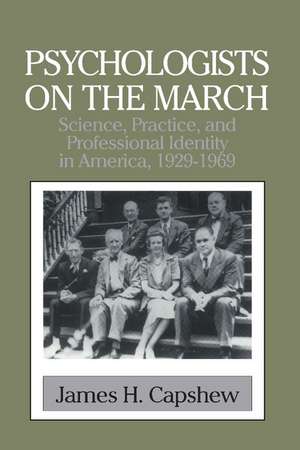Psychologists on the March: Science, Practice, and Professional Identity in America, 1929–1969: Cambridge Studies in the History of Psychology
Autor James H. Capshewen Limba Engleză Paperback – 12 ian 1999
| Toate formatele și edițiile | Preț | Express |
|---|---|---|
| Paperback (1) | 317.11 lei 6-8 săpt. | |
| Cambridge University Press – 12 ian 1999 | 317.11 lei 6-8 săpt. | |
| Hardback (1) | 695.59 lei 6-8 săpt. | |
| Cambridge University Press – 12 ian 1999 | 695.59 lei 6-8 săpt. |
Din seria Cambridge Studies in the History of Psychology
-
 Preț: 331.05 lei
Preț: 331.05 lei -
 Preț: 282.48 lei
Preț: 282.48 lei -
 Preț: 290.06 lei
Preț: 290.06 lei -
 Preț: 429.80 lei
Preț: 429.80 lei -
 Preț: 334.82 lei
Preț: 334.82 lei -
 Preț: 204.48 lei
Preț: 204.48 lei -
 Preț: 440.57 lei
Preț: 440.57 lei -
 Preț: 361.00 lei
Preț: 361.00 lei -
 Preț: 323.95 lei
Preț: 323.95 lei -
 Preț: 201.76 lei
Preț: 201.76 lei - 14%
 Preț: 870.35 lei
Preț: 870.35 lei
Preț: 317.11 lei
Nou
Puncte Express: 476
Preț estimativ în valută:
60.70€ • 65.95$ • 51.02£
60.70€ • 65.95$ • 51.02£
Carte tipărită la comandă
Livrare economică 21 aprilie-05 mai
Preluare comenzi: 021 569.72.76
Specificații
ISBN-13: 9780521565851
ISBN-10: 0521565855
Pagini: 292
Dimensiuni: 153 x 229 x 22 mm
Greutate: 0.4 kg
Editura: Cambridge University Press
Colecția Cambridge University Press
Seria Cambridge Studies in the History of Psychology
Locul publicării:New York, United States
ISBN-10: 0521565855
Pagini: 292
Dimensiuni: 153 x 229 x 22 mm
Greutate: 0.4 kg
Editura: Cambridge University Press
Colecția Cambridge University Press
Seria Cambridge Studies in the History of Psychology
Locul publicării:New York, United States
Cuprins
Introduction: the psychologists' war; 1. Growing pains: after the Great War; 2. Mobilizing for World War II: from national defense to professional unity; 3. Home fires: women psychologists and the politics of gender; 4. Sorting soldiers' psychology as personnel management; 5. Applied human relations: The utility of social psychology; 6. From the margins: making the clinical connection; 7. Engineering behavior: applied experimental psychology; 8. A new order: postwar support for psychology; 9. Remodeling the academic home; 10. The mirror of practice: towards a reflective science; 11. Beyond the laboratory: giving psychology away; Epilogue: science in search of self.
Recenzii
"The overall contribution to the historiography of psychology is very refreshing." Richarf T. von Mayrhauser, Ph.D., Journal of the History of the Behavioral Sciences
"This rich and detailed chronicle supplies a summary of psychology's role in the second great war of the century..." Journal of the History of Medicine
"...James H. Capshew's Psychologists on the March...promises a wide-ranging analysis of scientific, technological, and professional development in psychology during the middle third of the century. Capshew's writing is clear if uninspired, and his attitude toward psychology professors is uniformly respectful and appreciative. Notable in particular is his ability to synopsize psychologists' work in various government programs. Readers who are very familiar witth developments in psychology will find the book informative." Isis
"...impressive study...This book's most significant contribution, however, is its exceoptionally clear analysis of institutional history...Capshew's deeply researched and lucidly argued narrative goes a long way toward explaining psychology's remarkable evolution. The result is an extremely valuable analysis of a most unusual profession - one whose influence on twentieth-century American life is incontestable." Bull. Hist. Med.
"...extremely readable and accessible..." APA Review of Books
"...the most comprehensive survey of this period yet available. Nowhere else, is such a readable and complete story available." Journal of the History of Neurosciences
"James H Capshew's Psychologists on the March is an ambitious book...Psychologists on the March is thus an impressive book." The Jrnl of Amer. His. March 01
"This book will be widely red as the most thorough narrative, in terms of which to compare and argue individual views and experiences. Any psychologist interested in the steps by which the occupation has become such a massive presence in American life will get enormous stimulus and much information from the book." Contemporary APA Review of Books 2000
"This rich and detailed chronicle supplies a summary of psychology's role in the second great war of the century..." Journal of the History of Medicine
"...James H. Capshew's Psychologists on the March...promises a wide-ranging analysis of scientific, technological, and professional development in psychology during the middle third of the century. Capshew's writing is clear if uninspired, and his attitude toward psychology professors is uniformly respectful and appreciative. Notable in particular is his ability to synopsize psychologists' work in various government programs. Readers who are very familiar witth developments in psychology will find the book informative." Isis
"...impressive study...This book's most significant contribution, however, is its exceoptionally clear analysis of institutional history...Capshew's deeply researched and lucidly argued narrative goes a long way toward explaining psychology's remarkable evolution. The result is an extremely valuable analysis of a most unusual profession - one whose influence on twentieth-century American life is incontestable." Bull. Hist. Med.
"...extremely readable and accessible..." APA Review of Books
"...the most comprehensive survey of this period yet available. Nowhere else, is such a readable and complete story available." Journal of the History of Neurosciences
"James H Capshew's Psychologists on the March is an ambitious book...Psychologists on the March is thus an impressive book." The Jrnl of Amer. His. March 01
"This book will be widely red as the most thorough narrative, in terms of which to compare and argue individual views and experiences. Any psychologist interested in the steps by which the occupation has become such a massive presence in American life will get enormous stimulus and much information from the book." Contemporary APA Review of Books 2000
Descriere
Psychologists on the March argues that Second World War had a profound impact on the modern psychological profession in America.















